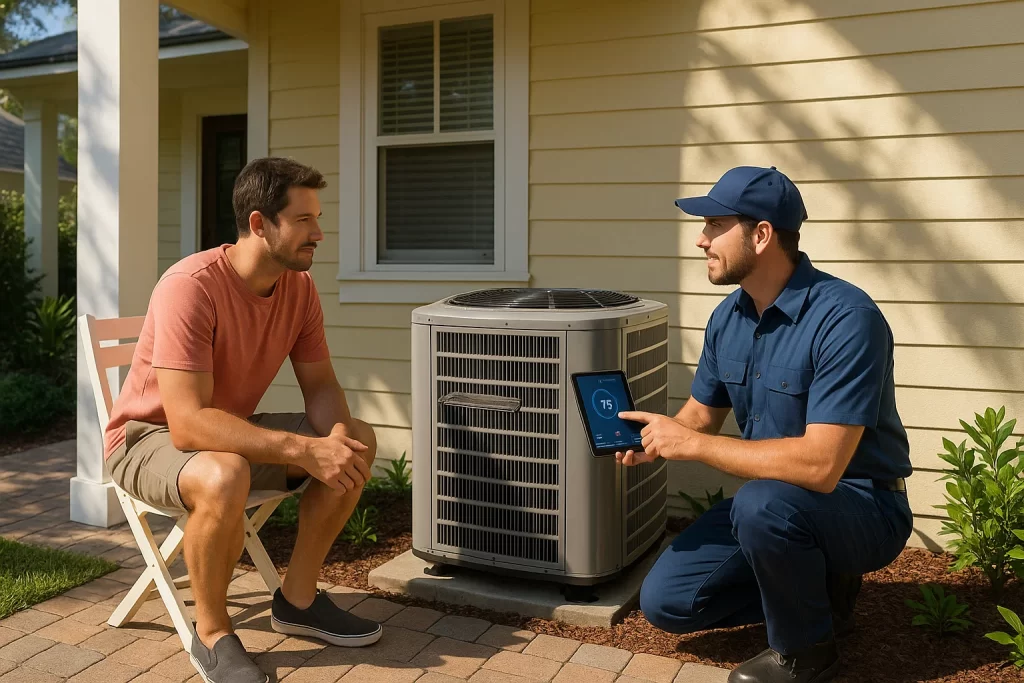As summer temperatures climb, your air conditioner becomes your home’s MVP: working overtime to keep you cool and comfortable. But just like any hardworking machine, your AC needs some attention to stay in top shape.
Without proper care, it may struggle to perform, leading to higher energy bills, reduced comfort, and even mid-summer breakdowns. Fortunately, with a few smart strategies, you can keep your AC running efficiently even during the hottest days of the year. Here’s how to help your air conditioning system beat the heat, and save you money in the process.

1. Change Your Air Filter Regularly
One of the simplest and most effective ways to keep your AC running efficiently is to replace the air filter every 1-3 months. A dirty or clogged filter restricts airflow, forcing your system to work harder to push cool air through your home. This not only drives up your energy use but also increases wear and tear on the system.
Pro tip: During peak cooling season, check your filter monthly – especially if you have pets or allergies.
2. Schedule Routine Professional Maintenance
Annual or seasonal AC tune-ups are essential for maintaining efficiency. A licensed HVAC technician can:
- Inspect and clean coils
- Check refrigerant levels
- Test electrical components
- Ensure the system is running optimally
Routine maintenance not only improves energy efficiency but can also catch small issues before they become costly repairs. If you haven’t scheduled a tune-up this year, now’s the time.
3. Use a Programmable Thermostat
Smart or programmable thermostats can reduce energy usage while maintaining comfort. Program your thermostat to increase the temperature when you’re away or asleep, and lower it again when you’re home and active.
Set it to around 78°F when you’re home for the best balance of comfort and efficiency. Every degree you raise your thermostat can save up to 3% on cooling costs.
4. Keep Heat Out
The harder your AC has to work to cool down a sun-soaked home, the more energy it uses. You can help your system by reducing indoor heat gain:
- Close blinds or curtains during the hottest parts of the day
- Use reflective window film to block UV rays
- Avoid using heat-generating appliances like ovens and dryers during peak afternoon hours
- Seal air leaks around windows and doors to prevent cool air from escaping
These small changes can make a big impact on how hard your AC needs to work.
5. Clean Around the Outdoor Unit
Your system’s outdoor condenser unit needs room to breathe. Make sure it’s free of grass, leaves, and debris that could block airflow. Trim back any plants or shrubs to maintain at least two feet of clearance around the unit.
Also, gently hose off the coils to remove dust and grime, but avoid using high-pressure water or cleaning chemicals.
6. Don’t Overcool Your Home
Running your AC too cold not only uses more energy, but it can also overwork your system. Resist the urge to set the thermostat below 70°F during a heatwave. Instead, use ceiling fans to enhance the cooling effect and maintain a steady, moderate indoor temperature.
Remember: fans cool people, not rooms – so turn them off when you leave a space.
7. Consider an AC Upgrade
If your system is over 10–15 years old, it may be time to consider a more energy-efficient replacement. Newer AC units come with better SEER2 (Seasonal Energy Efficiency Ratio) ratings, advanced features, and smart thermostat compatibility, all of which help keep energy use low while boosting comfort. Ask your HVAC professional to evaluate your current system’s efficiency and help you explore upgrade options if needed.
Call Touchstone Heating and Air 24/7 for exceptional customer service! Serving the communities of North Central Florida since 1998. /contact/contact
